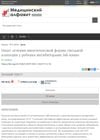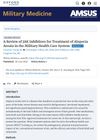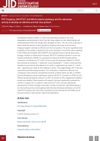 6 citations,
November 2022 in “Journal of autoimmunity”
6 citations,
November 2022 in “Journal of autoimmunity” JAK inhibitors like tofacitinib may effectively treat Alopecia Areata.
4 citations,
June 2023 in “Frontiers in immunology” JAK inhibitors help hair regrowth in alopecia areata but have a high risk of side effects.
4 citations,
January 2020 in “PubMed” JAK inhibitors may become the first approved treatment for alopecia areata if they are proven safe and effective.
 3 citations,
April 2016 in “Journal of Investigative Dermatology”
3 citations,
April 2016 in “Journal of Investigative Dermatology” Tofacitinib, a JAK inhibitor, improved hair regrowth in most patients with severe alopecia areata and had minimal side effects.
 2 citations,
April 2023 in “JEADV. Journal of the European Academy of Dermatology and Venereology/Journal of the European Academy of Dermatology and Venereology”
2 citations,
April 2023 in “JEADV. Journal of the European Academy of Dermatology and Venereology/Journal of the European Academy of Dermatology and Venereology” JAK-inhibitors for alopecia areata are generally safe with mostly mild side effects and a low rate of treatment withdrawal.
 2 citations,
April 2018 in “Journal of Investigative Dermatology”
2 citations,
April 2018 in “Journal of Investigative Dermatology” Frontal fibrosing alopecia shows increased inflammation and JAK-STAT pathway activity without reduced hair proteins.
 2 citations,
April 2017 in “Journal of Investigative Dermatology”
2 citations,
April 2017 in “Journal of Investigative Dermatology” Tofacitinib helped over half of the patients with severe hair loss regrow at least 50% of their hair.
 1 citations,
January 2020 in “Surgical & Cosmetic Dermatology”
1 citations,
January 2020 in “Surgical & Cosmetic Dermatology” Combining oral minoxidil with JAK inhibitors helps regrow hair in severe alopecia areata cases.
 1 citations,
April 2017 in “Journal of Investigative Dermatology”
1 citations,
April 2017 in “Journal of Investigative Dermatology” Tofacitinib may slow hair loss in scarring alopecias but is unlikely to regrow significant hair.
 September 2014 in “SciBX”
September 2014 in “SciBX” JAK inhibitors may help treat alopecia areata and promote hair regrowth.
 July 2024 in “Medical alphabet”
July 2024 in “Medical alphabet” JAK inhibitors like tofacitinib may effectively treat alopecia in children without major side effects.
 June 2024 in “Military medicine”
June 2024 in “Military medicine” JAK inhibitors like baricitinib and ritlecitinib are effective new treatments for severe alopecia areata.
 May 2024 in “Archives of dermatological research”
May 2024 in “Archives of dermatological research” Enz_MoriL from mulberry leaves helps hair growth by affecting specific cell pathways.
 April 2024 in “Frontiers in pharmacology”
April 2024 in “Frontiers in pharmacology” Brepocitinib 30mg is most effective for moderate-to-severe alopecia areata, but ritlecitinib 50mg may offer a better balance of safety and effectiveness.

Baricitinib may effectively treat oral lichen planus.
 January 2024 in “Journal of Crohn's and colitis”
January 2024 in “Journal of Crohn's and colitis” Janus Kinase inhibitors are effective and have an acceptable safety profile for treating moderate to severe Ulcerative Colitis.
January 2024 in “Drug Discoveries & Therapeutics” Baricitinib-loaded EVs help hair regrowth in alopecia areata by reducing inflammation and promoting hair follicle regeneration.
 November 2023 in “The journal of investigative dermatology/Journal of investigative dermatology”
November 2023 in “The journal of investigative dermatology/Journal of investigative dermatology” Cancer treatment drugs can cause permanent hair loss by damaging hair follicle stem cells, but a specific inhibitor might reverse this effect.
 November 2023 in “The journal of investigative dermatology/Journal of investigative dermatology”
November 2023 in “The journal of investigative dermatology/Journal of investigative dermatology” Oral Janus kinase inhibitors may be an effective treatment option for lichen planopilaris with some risk of increased cholesterol and liver enzyme levels.

Tofacitinib helped a woman with total-body hair loss grow her hair back.
 November 2023 in “Journal of Investigative Dermatology”
November 2023 in “Journal of Investigative Dermatology” JAK inhibitors partially restore scalp bacteria balance in alopecia areata patients.
 October 2023 in “Frontiers in medicine”
October 2023 in “Frontiers in medicine” Comprehensive screening for infections is crucial before starting JAK inhibitors in alopecia areata patients.
 October 2023 in “bioRxiv (Cold Spring Harbor Laboratory)”
October 2023 in “bioRxiv (Cold Spring Harbor Laboratory)” A protein called EGFR protects hair follicle stem cells, and when it's disrupted, hair follicles can be damaged, but blocking certain pathways can restore hair growth.
 September 2023 in “Journal of the American Academy of Dermatology”
September 2023 in “Journal of the American Academy of Dermatology” Topical tofacitinib helped a man with severe scalp condition after other treatments failed.
 September 2023 in “JAAD case reports”
September 2023 in “JAAD case reports” A man developed oral hairy leukoplakia while on baricitinib, a medication for alopecia and arthritis, and doctors should watch for such side effects.
 January 2023 in “Indian Dermatology Online Journal”
January 2023 in “Indian Dermatology Online Journal” No single ideal JAK inhibitor for alopecia areata has been determined; JAK3 inhibitors may be promising with fewer side effects.
 November 2022 in “Journal of Investigative Dermatology”
November 2022 in “Journal of Investigative Dermatology” The lotion with specific plant extracts effectively increased hair growth and improved hair cycle in subjects after 3 months.
 September 2022 in “Hair transplant forum international”
September 2022 in “Hair transplant forum international” JAK inhibitors like baricitinib are a new FDA-approved treatment for alopecia areata, but safety data is incomplete.
 July 2022 in “The journal of investigative dermatology/Journal of investigative dermatology”
July 2022 in “The journal of investigative dermatology/Journal of investigative dermatology” Particulate matter causes inflammation in hair cells, potentially harming hair growth.
JAK inhibitors show promise in treating moderate to severe alopecia areata.


























